|
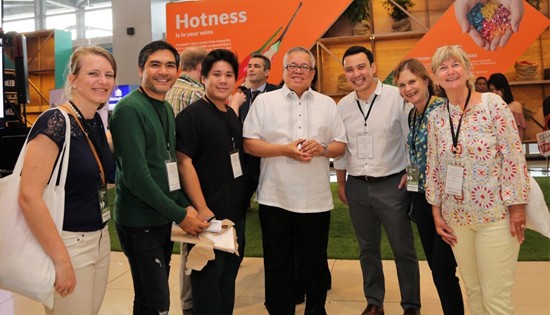
From
L to R: Silva Cacao Chief Cacaopreneur Katrien Delaet, Auro
Chocolate Davao Operations Manager Louie Cena, Auro
Chocolate Co-founder Mark Ocampo, Trade Secretary Ramon
Lopez, PTIC Commercial Counsellor Ben Uy, Chocolate
Historian & Author Valentine Tibere, and Silva Cacao Founder
Ms. Sylvie Guillaume. |
DTI lauds arrival
of Filipino cacao beans in European markets
By
DTI-OSEC-PRU
April 21, 2020
MANILA – Department
of Trade and Industry (DTI) Secretary Ramon Lopez congratulates Auro
Chocolate for being the first Philippine company to provide a major
shipment of cacao beans to the European market. On 16 April 2020,
the container shipment of Mindanao-sourced, premium cacao beans
arrived at the port of Antwerp, Belgium.
The shipment, which
brought 20,000kg of cacao beans to Belgium, is composed of five
different cacao varieties, including the Paquibato Origin, winner of
the Cocoa Excellence Award in 2019.
“We are very proud of Auro
Chocolate for their success and even more excited for what this
would mean to our cacao farmers,” said Sec. Lopez.
The trade secretary added
that the shipment not only meant the introduction of Philippine
cacao to renowned markets in Europe but also signified the
strengthening of country pride, especially for Filipino farmers, to
the Western trade.
Last May 2019, the
Philippine Trade and Investment Center (PTIC) Brussels, in
partnership with the Center for International Trade Expositions and
Missions (CITEM) and the Regional Operations Group (ROG),
facilitated European cacao and chocolate experts to attend the
International Food Exhibit (IFEX) and visit cacao farms in Mindanao.
Among the delegates included Silva Cacao, the Antwerp-based company
responsible for bringing the shipment to Belgium.
Silva Cacao General
Manager Katrien Delaet expressed confidence in the introduction of
diverse flavors of Philippine cacao to European chocolate makers.
“I am sure that chocolate
makers can’t wait to start working with these cacao beans. By adding
their own magic, chocolate makers can bring out the best of the
flavours in each cacao quality – from fruity, to floral, to nutty,
to woody, to caramel, and much more. Chocolate lovers all over
Europe will be in for a surprise!” Delaet said.
She added, “We are very
grateful that the PTIC helped paved the way for us to learn more
about Philippine cacao. We discovered amazing qualities. And with
this award for the Paquibato cacao, the Philippines is in the top 20
best cacaos worldwide, and even in the top 5 in Asia. Never before
has a Philippine cacao won this award; it is indeed a recognition of
the premium cacao produced in the country.”
Meanwhile, PTIC Director
and Commercial Counsellor Benedict Uy expressed hope for the
business community amid the COVID-19 pandemic.
“While current business
climate in Europe is dampened by the COVID-19 issue and lockdowns,
we share the optimism and eagerness of the business community,
including the Belgian and European chocolate makers, that things
will be well again in the coming months,” he said.
Sec. Lopez added that the
good news serves as a silver lining and an inspiration for the
agricultural sector despite the harsh impact of the global pandemic.
Chicken
production in Eastern Visayas surge by 6.9% in the fourth quarter of
2019
By
PSA-8
April 21, 2020
TACLOBAN CITY – The
volume of chicken production in Eastern Visayas increased by 6.9
percent during the fourth quarter of 2019. It went up to 16,673
metric tons (MT) in the fourth quarter of 2019 from 15,602 MT in the
same quarter of 2018.
Eastern Visayas production
accounted for 3.2 percent of the country’s total chicken production
during the fourth quarter of 2019. It ranked eighth among regions
with the highest chicken production in the country.
The chicken population in
Eastern Visayas dropped by 15.8 percent, from 2,524,559 birds as of
1 January 2019 to 2,124,681 birds as of 1 January 2020.
All provinces contributed
to the decline in chicken population, except for Northern Samar and
Southern Leyte which posted increases at 16.8 percent and 4.5
percent, respectively.
Among provinces, Leyte
recorded the highest chicken population at 831,095 birds as of 1
January 2020. It comprised more than one third (39.1 percent) of the
total chicken population in the region. Southern Leyte ranked second
with 438,709 birds, accounting for 20.6 percent of the region’s
total chicken inventory. Eastern Samar, meanwhile, registered the
lowest inventory of chicken with a 4.1 percent share or 87,268
birds.
Among the type of chicken,
only layer chickens posted an increase at 7.9 percent, from 452,613
birds as of 1 January 2019 to 488,322 birds as of 1 January 2020.
Northern Samar recorded the highest increase at 67.1 percent,
followed by Southern Leyte at 8.0 percent. Leyte posted the lowest
increase at 2.0 percent. Meanwhile, Eastern Samar, Samar and Biliran
declined by 41.9 percent, 19.2 percent and 12.3 percent,
respectively.
Broiler chickens dropped
tremendously by almost half (46.8 percent) of its inventory, from
472,666 birds as of 1 January 2019 to 251,348 birds as of 1 January
2020. This was largely attributed to the zero or no inventory of
broiler chicken in Samar Province due to downtime period on 1
January 2020. Eastern Samar recorded the highest decrease at 91.7
percent. Likewise, Leyte’s broiler population, which shared 57.0
percent of the region’s total broiler population as of 1 January
2020, also declined by 5.6 percent. Southern Leyte’s broiler chicken
population, on the other hand, expanded by 90.5 percent. It
increased to 61,540 birds as of 1 January 2020 from 32,298 birds as
of 1 January 2019.
The number of
native/improved chickens also went down by 13.4 percent, from a
total inventory of 1,599,280 birds as of 1 January 2019 to 1,385,011
birds as of 1 January 2020. All provinces contributed to the decline
in the inventory of native/improved chicken in the region.
About 65.2 percent of the
chicken population were native/improved chickens. Layer chickens
accounted for 23.0 percent, while broiler chickens comprised 11.8
percent.
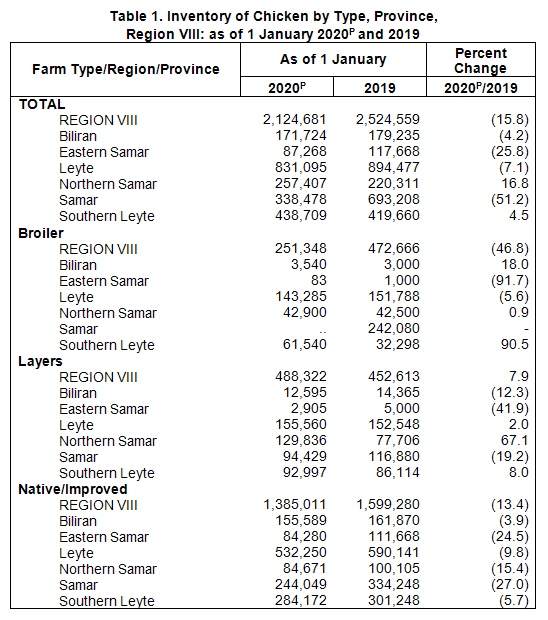
DTI mobilizes
FabLabs to surmount COVID crisis
By
DTI-ROG
April 20, 2020
MAKATI CITY – The
Department of Trade and Industry-Regional Operations Group (DTI-ROG),
spearheaded by Undersecretary Blesila Lantayona, and DTI-Region 7
have activated its network of fabrication laboratories (FabLabs) in
Central Visayas to produce personal protective equipment (PPEs) in
the fight against the Coronavirus Disease 2019 (COVID-19).
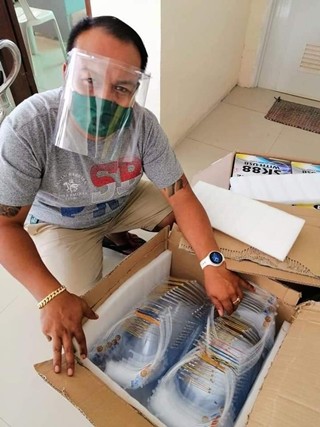 A team of volunteers,
faculty members and staff at school-based FabLabs in the region have
designed and produced personal protective equipment to contribute to
the much-needed supply of PPEs in the region.
A team of volunteers,
faculty members and staff at school-based FabLabs in the region have
designed and produced personal protective equipment to contribute to
the much-needed supply of PPEs in the region.
Central Visayas has eight
FabLabs three located in Bohol, Negros Oriental and Siquijor, and
five in Cebu.
“As of April 16 this year,
FabLabs in Central Visayas have produced 24,358 face shields, 4,093
cloth face masks, 359 medical gowns, and 20 aerosol boxes. All eight
fablabs in Central Visayas have been busy for the past month
producing PPEs,” Philippines’ FabLab Champion and DTI-Region 7
Assistant Regional Director Maria Elena Arbon reported.
Arbon also said that
FabLabs in Central Visayas are part of a network of FabLabs in the
Philippines working closely together with their stakeholders, and
partners in both government and private sectors, to respond to the
needs amid the pandemic outbreak in our country.
“Overall, Fablabs in the
Philippines produced 46,055 face shields, 23,104 cloth face masks,
1,201 medical gowns, and 217 aerosol boxes as of April 16, 202. We
are still accepting donations of raw materials for the production of
the PPEs,” said Arbon.
Director Arbon encourages
everyone to visit the following google site, https://tinyurl.com/FablabPHResponse,
to link themselves to a FabLab near their vicinity and ask for any
assistance that the laboratory can do. This is also a way for local
suppliers of raw materials to get in touch with FabLabs in their
area so these facilities can continue with the mass production.
DTI-ROG Assistant
Secretary Asteria Caberte, who pushed for the funding of the project
and boosted morale of volunteers, informed the public that FabLabs
are not the only DTI-assisted programs responding to the COVID
crisis.
“We have DTI assisted
MSMEs such as Uniform Solutions, Tubigon Loomweavers Multi-purpose
Cooperative, LAMAC Multi-purpose Cooperative and Alter to Enhance
Clothier that are also mass producing cloth face masks. These
cooperatives and business enterprises are repurposing their
manufacturing capacity to meet local demand. We have always
encouraged those we have assisted to exercise their corporate
responsibility and give back to the community in whatever way they
can,” Asec. Caberte added.
A fabrication laboratory
is a technical prototyping platform for innovation and invention
that allows local manufacturers and creatives to make prototypes and
products such as equipment, machinery and electronic gadgets; create
scale models, illustrate graphic designs and mass-produce products,
among others. A fab lab is typically equipped with an array of
flexible computer-controlled tools that cover several different
length scales and various materials, with the aim to make "almost
anything".
FabLabs in the Philippines
are closely aligned with the global open-source maker culture, and
the free and open-source movement, and shares philosophy as well as
technology with them.
The International FabLab
Network is an open, creative community of fabricators, artists,
scientists, engineers, educators, students, amateurs, professionals,
of all ages located in more than 90 countries in approximately 1,500
FabLabs. From community based labs to advanced research centers, Fab
Labs share the goal of democratizing access to the tools for
technical invention and product innovation.
Workers calls for
post-lockdown health and death insurance coverage for new potent
workplace hazard 2019 coronavirus disease
By
Associated Labor Unions
April 20, 2020
QUEZON CITY – The
country's biggest group of unions the Associated Labor Unions (ALU)
is calling the Employment Compensation Commission (ECC) to include
in their work-related compensation programs and services the
hospitalization and death benefits insurance to government and
private employees who might be exposed to a new, potent and dreaded
workplace hazard COVID-19 inside work establishments and while
performing job function.
The COVID-19 employment
insurance coverage is important because of the great danger and
hazard it poses to returning employees once the Enhanced Community
Quarantine is lifted, the group insists.
The ECC is a
quasi-judicial corporate entity attached to the Department of Labor
and Employment (DOLE) created to implement the Employees'
Compensation Program by providing package of benefits for public and
private sector employees and their dependents in the event of
work-connected contingencies such as sickness, injury, disability or
death.
It is tasked by law to
develop and implement effective occupational safety and health
policies and programs for the promotion of a healthy working
population and provide workers and their dependents with benefits
and rehabilitation services in the event of work-connected accident,
injury, illness and death using a part of the fund from monthly
remittance collected by the Social Security System (SSS).
According to the labor
federation, the insurance coverage must be in force as soon as the
community quarantine is lifted and employees are allowed to return
to their places of work.
ALU National Executive
Vice President Gerard Seno said the it is important for ECC to
classify COVID-19 as a 'dreaded disease' so that formal government
and private sector employees who will return to work following once
the enhanced community quarantine lockdown order is lifted on April
30th are protected.
"We urge the ECC board to
immediately issue a resolution providing insurance coverage for
employees in private and government sectors as safety net for
workers who might be infected or exposed to the COVID-19 hazard risk
on the way or from work and or have been exposed inside the work
establishments," Seno said.
The call was made as ALU
and other stakeholder labor groups helps the Department of Labor and
Employment (DOLE) draft a COVID-19 occupational safety and health (OSH)
guidelines which would serve as the standard protocols for employers
and employees in preventing, controlling and managing COVID-19 in
workplaces once employees are allowed to go back to work.
Seno said the OSH
guidelines must be in place on or before the resumption of work so
that workers who will return to work will not be unnecessarily
exposed to COVID-19 while in transit and while inside the workplace.
"These guidelines
protocols are important for workers working in hospitals, clinics,
media stores, restaurants, hotels, public transportation, malls,
offices, banks, factories, among others. If these OSH standards are
not being followed, thousands of workers, including their family
members and co-workers, will be exposed to COVID-19," Seno said.
CNT leader
killed, high powered firearm and explosive seized in Calbiga, Samar
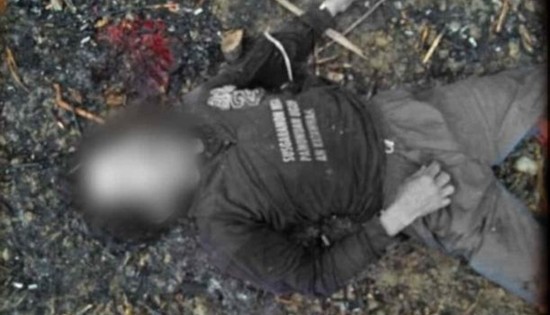
By
DPAO, 8ID PA
April 19, 2020
CAMP LUKBAN, Catbalogan
City – Elements of the 46th Infantry Battalion, 8th Infantry
Division, Philippine Army encountered more or less five fully armed
men believed to be remnants of a Communist NPA Terrorist (CNT) group
operating in southern part Samar resulting to the death of CNT
leader Noel Galvez alias Bani in a 3-minute firefight at the
vicinity of Brgy. Buluan, Calbiga, Samar at around 5:15 in the
morning of April 18, 2020.
There was no casualty in
the government forces while the enemy, aside from the killed CNT
leader, one (1) M14 rifle loaded with ammunition and one (1)
Improvised Explosive Device (IED) with estimated weight of seven
kilograms were seized.
The gunfight was the
result of the timely report of some concerned civilians pertaining
the presence of the CNTs led by Galvez harassing the populace.
The same group of CNTs was
responsible for the murder of former rebel Ildefonso Nablo Jr alias
Marwan last April 9, 2020.
Lieutenant Colonel Rhomel
R. Langcauon, Commanding Officer of 46IB lauded his troops for the
successful community security operation. He also thanked the
vigilance of the community for the timely information provided to
the security forces.
Colonel Camilo Z. Ligayo,
Commander of 801st Infantry Brigade stated, "The neutralization of
Noel Galvez alias Bani will bring a strong and clear message to the
rebels that the government is serious in ending local communist
armed conflict in Eastern Visayas."
"We will pursue these
terrorists with the help of the community until they run out of
ground to retreat to", Ligayo added.
Discontinuation
of DOLE cash assistance sow confusion, demoralization &
consternation among millions of displaced workers
By
TUCP
April 17, 2020
QUEZON CITY –
Millions of locked down rank-and-file workers felt betrayed by the
discontinuation of cash dole out provided by the Department of Labor
and Employment (DOLE) to incomeless employees displaced by the
government imposition of Luzon-wide extended enhanced community
quarantine lockdown shutdown of all work establishments and business
operations beginning March 15th last month to minimize local
transmission of novel 2019 coronavirus disease (COVID-19), according
to the country's biggest workers group Trade Union Congress of the
Philippines (TUCP).
The DOLE on Thursday
announced the suspension of five thousand peso financial assistance
under the Covid Adjustment Measures Program (CAMP) for formal sector
workers effective April 15, 2020 following near depletion of the
program's P1.6 billion budget.
A statement from the DOLE
said the program has disbursed P1.2 billion which benefitted 236,412
employees of 10,663 work establishments since they begin the payout
on March 23 or eight days after the total lockdown. The DOLE said
there were 1.4 million work establishments and enterprises have
rendered reported they were affected by the expanded ECQ.
"Because of this cash
assistance stoppage, jobless ordinary workers and their families are
confused and felt betrayed right now. Millions of locked down
workers particularly those who have yet to receive the cash grant
are feeling betrayed by the stoppage of their only lifeline cash
assistance. Displaced workers felt they were pushed into lockdown,
deprived of their jobs, kept in the dark corner and left out amid
hunger, poverty and fear," said TUCP president and TUCP Party-list
Rep. Raymond Mendoza.
The labor group said the
Inter-Agency Task Force must immediately, widely and clearly explain
the matter with the ordinary workers and avoid confusion.
"To cure the gaping
widespread confusion and insecurity, we urged the government to
clarify the matter immediately and clearly to the millions of
displaced workers particularly those who have yet to receive the
CAMP cash assistance," Mendoza said.
The TUCP said there at
least 4 million rank-and-file workers were rendered jobless by the
government imposed lockdown to minimize local transmission of
COVID-19.
Higher risk of
online sexual abuse and exploitation of children during quarantine
SaferKidsPH promotes child
online safety in support of the national COVID-19 response
Press Release
April 17, 2020
MANILA –
SaferKidsPH, a consortium of Save the Children Philippines, The Asia
Foundation and UNICEF, and funded by the Australian Government, is
expanding its efforts to protect children against online sexual
abuse and exploitation during the COVID-19 enhanced community
quarantine (ECQ).
While online platforms are
used for positive learning and socialising, they can also expose
children to cyberbullying, online sexual abuse and exploitation, and
other forms of harm. These risks are greater during the quarantine
period, as children spend more time online, with or without the
guidance of a parent or carer.
Starting April 15,
SaferKidsPH in collaboration with the Department of Information and
Communications Technology, the National Telecommunications
Commission, Smart Communications, and Globe Telecom will launch an
SMS campaign focusing on practical child online safety measures that
can be used during the COVID-19 ECQ. Mobile subscribers will be
invited to visit the platforms of SaferKidsPH and UNICEF for more
information.
During this enhanced
community quarantine, children could be at a higher risk of being
exposed to online predators. But this is not the only threat.
Unfortunately, most cases of online sexual exploitation of children
in the Philippines involve parents or family members as
facilitators. As the country bunkers down to battle the COVID-19
pandemic, more children could be subject to exploitation in their
own homes.
Brigadier General
Alessandro C. Abella, Chief of the Philippine National Police-Women
and Children Protection Center (PNP-WCPC), said that during the
lockdown, his staff will continue to receive, monitor, and respond
to online sexual abuse and exploitation of children-related reports.
“Even in the midst of the COVID-19 crisis, the PNP-WCPC continues to
be aggressive in its fight against online sexual exploitation of
children,” he said.
For more information on
how to stay safe online and how you can help stop online sexual
exploitation of children, please visit www.saferkidsph.org. You may
also follow SaferKidsPH on Facebook, Instagram, Twitter, and YouTube.
For further support, you
can call the following helplines:
1) PNP Aleng Pulis - +63
919 777 7377
2) Action Against Human
Trafficking - 1343 within Metro Manila; (02) 1343 outside Metro
Manila
3) Bantay Bata - 163
4) UP-PGH COVID-19
Bayanihan Operations Center - 155 200 or https://publicservice.up.edu.ph/uppgh-bayanihan-na.
|
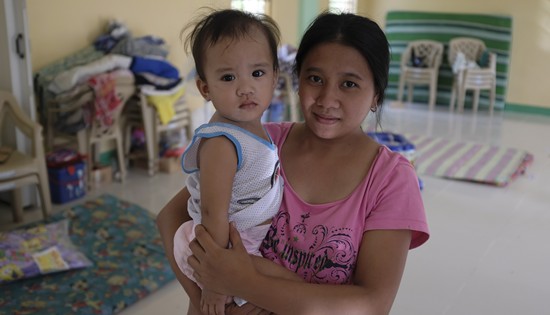
Aubek
with her child, Raiven, inside the evacuation center where
they are staying in Irosin, Sorsogon.
(LJ Pasion/Save the
Children) |
Save the Children
Philippines to LGUs: No Milk Formula in the time of COVID-19
By
Save the Children
Philippines
April 17, 2020
MANILA – Save the
Children Philippines is urging local government units (LGUs),
private groups, charitable organizations and individuals to adhere
to existing laws that prohibit the distribution of infant formula or
breastmilk substitute as part of relief goods to encourage
breastfeeding among mothers, ensure good health and adequate
nutrition of infants and young children.
Atty. Alberto Muyot, Chief
Executive Officer of Save the Children Philippines, said nutrition
and health support to children, pregnant and lactating mothers must
be integrated into the national and local government response during
the COVID-19 pandemic including the promotion of breastfeeding.
Several cities and
municipalities have been distributing milk formula as part of relief
goods to their constituents, which raised concerns of breastfeeding
advocates.
“Children suffer the worst
impact of the COVID-19 pandemic due to rising levels of poverty,
ill-health, and malnutrition,” said Atty. Muyot. “We call on local
governments to support parents and guardians by encouraging mothers
to breastfeed, and provide access to affordable and healthy food.”
He said donations of
infant formula in times of disasters, calamities, and emergencies
including pandemic are strictly prohibited under the Milk Code or
Executive Order 51 of 1986, the Expanded Breastfeeding Promotion
under Republic Act 10028, and the Republic Act 11148 or Kalusugan at
Nutrisyon ng Mag-Nanay Act which is being implemented nationwide.
Save the Children Philippines joins the Department of Health and the
National Nutrition Council in calling all LGUs to strictly adhere to
these laws and guidelines, especially during emergencies like the
COVID-19 pandemic.
These laws mandate local
government units to establish milk banks during emergency situations
to provide access to breastmilk when mothers become sick or not able
to breastfeed their babies. The milk banks will provide a venue for
lactating mothers who wish to donate their breastmilk.
Dr. Amado Parawan, Health
and Nutrition Advisor of Save the Children Philippines said
breastfeeding during the COVID-19 pandemic is highly encouraged to
strengthen the immune system of babies, protect children from
respiratory and gastrointestinal illnesses, prevent malnutrition,
and ensure bonding between the mother and her baby. He said
breastmilk is safe and ensures babies grow up healthy, and increases
IQ.
“Breastmilk is the best
source of nutrition for babies and there is no milk formula that can
provide the same optimum health and nutrition benefits to infants
and young children,” said Dr. Parawan.
He added that colostrum –
the first milk formed after the delivery of the newborn contains
antibodies that protect the newborn against diseases. Recent studies
also state that colostrum has properties against diseases caused by
viruses.
He said mothers, even
those infected by COVID-19, can still continue breastfeeding while
limiting the baby’s exposure to the virus by using respiratory
precautions. Mothers who have been infected by COVID-19 may choose
to breastfeed, but they must wear a facemask and wash hands
thoroughly with soap and water. “There are no clear scientific
studies that the Coronavirus can be transmitted through breastmilk,”
said Dr. Parawan.
Also, mothers who are sick
can choose to manually express breastmilk to maintain milk supply.
These mothers should wash their hands properly before doing breast
milk expression.
Dr. Parawan said expectant
mothers should eat healthy food, maintain personal hygiene, and take
iron folic supplements. Breastfeeding mothers must have a support
system through their husbands, partners, and other members of the
family.
He reminded pregnant
mothers to go to birthing facilities, lying-in clinics, and
infirmary with a midwife, nurse, or doctor as many hospitals are
crowded with COVID-19 patients. He also advised mothers giving birth
to seek help from health and nutrition workers and breastfeeding
support groups when facing difficulties in initiating and continuing
breastfeeding.
Save the Children
Philippines advocated for the passage of First 1,000 Days law or RA
11148, which mandates exclusive breastfeeding for babies up to six
months and continued breastfeeding up to two years while starting
complementary feeding.
“Children, including
pregnant and lactating mothers, are most vulnerable during COVID-19
pandemic, and local government units should prioritize their health
and nutrition,” said Dr. Parawan.
NPA insists to
inflict chaos over COVID-19 pandemic in Nothern Samar
By
DPAO, 8ID PA
April 12, 2020
CAMP LUKBAN, Catbalogan
City – The troops of the 20th Infantry Battalion of the 8th
Infantry Division, Philippine Army, while conducting community
protection patrol in response to a report from concerned civilians
on the presence of armed group, were fired upon by about ten (10)
Communist NPA Terrorists (CNTs) at the vicinity of Brgy Diit de
Turag, Silvino Lubos, Northern Samar at 9:45 in the morning, today,
April 11, 2020.
The 5-minute firefight
urged the CNTs to retreat and took the north direction of Brgy.
Ynaguingayan, Pambujan, same province. The troops seized one Huawei
touch screen cellphone, one backpack, fourteen live ammunition of
M16 rifle, one live ammunition of M14 rifle, and subversive
documents. There is no reported casualty in the government side
while it is still undetermined on the enemies’ side.
It can be recalled that on
April 6, 2020 four improvised explosive devices (IEDs) were
recovered in the vicinity of Brgy. Hubasan, Calbiga, Samar with the
CNTs' intent to victimize frontliners conducting COVID-19 prevention
efforts.
In the morning of April 7,
2020, about 30 CNTs swooped down on Sitio Bangon, Barangay
Guinmayohan, Balangiga, Eastern Samar and took the relief goods
intended for the locals.
While in the afternoon of
same day, more or less fifteen (15) CNTs harassed and forcibly took
foodstuffs from the populace of Brgy. Lakandula, Las Navas, Northern
Samar resulting to an encounter where one soldier was wounded.
It is worth mentioning
that on March 19, 2020, President Rodrigo R. Duterte declared a
unilateral ceasefire with the CPP-NPA-NDF as the Communist Party of
the Philippines ordered its armed regulars on March 26, 2020 to
observe a ceasefire with the government.
These willful series of
attacks by the terrorists are violative of the unilateral ceasefire
between the state and the CPP-NPA.
The terrorists are
purposely casting the sufferings of the residents caused by the
COVID-19 pandemic by orchestrating attacks that induce fear to the
whole community.
Colonel Zosimo A. Oliveros,
Commander, 803rd Infantry (Peacemaker) Brigade, in his message said
that “The violence concerted by the CNTs are causing tremendous
effect to the community while the peace arms of the government are
focused in alleviating the crisis brought by the corona virus. Your
army, however, assures the public that we will, at all times, defend
the citizenry and will remain steadfast to grapple against the
terroristic acts of our enemies”.
“We convey our utmost
gratitude to the concerned citizens for providing us information of
the whereabouts of our enemies and we plea that you will continue to
work with us to prevent the enemies from causing harm to the whole
populace”, Oliveros added.
CPP-NPA
aggravates COVID-19 crisis situation in Northern Samar
By
DPAO, 8ID PA
April 8, 2020
CAMP LUKBAN, Catbalogan
City – The 20th Infantry Battalion, 8th Infantry Division,
Philippine Army received a report from a concerned civilian
pertaining the presence of an armed group believed to be Communist
NPA Terrorists (CNTs) harassing the locals of Brgy. Lakandula, Las
Navas, Northern Samar. The CNTs were forcefully collecting foods and
other basic commodities while the village is on General Community
Quarantine (GCQ) due to COVID-19 which prompted the military to
conduct Community Protection Patrol and engage in a firefight more
or less fifteen (15) CNTs on April 7, 2020 at around 2:50 in the
afternoon.
The encounter resulted to
the wounding of one soldier while there are undetermined number of
casualties of the enemies as evidenced by bloodstains found in the
enemy's escape route.
It can be recalled that on
March 19, 2020, President Rodrigo R. Duterte declared a unilateral
ceasefire with the CPP-NPA to which the CPP ordered the NPA on March
26, 2020 a similar ceasefire with the government as the nation
grapples with the COVID-19 pandemic.
"While the entire nation
is battling the contagion, the CNTs are taking advantage of the
ceasefire by regrouping and arming themselves to orchestrate an
attack against our government forces. The enemies are intimidating
the populace who are already experiencing fear and uncertainty due
to the GCQ by forcibly extracting food causing thereby scarcity of
resources in the far-flung communities.”, stated Major General Pio
Q. Dinoso III AFP, Commander of 8ID.
"This deliberate violation
of the ceasefire by the NPA will not hamper the delivery of the
urgently needed medical, health and economic assistance as well as
the movement of the people. Your Army assures the public that we
will not drop our guard in securing the people and to work with the
government to bring back normalcy in our lives that are derailed by
the dreaded virus”, Dinoso added.